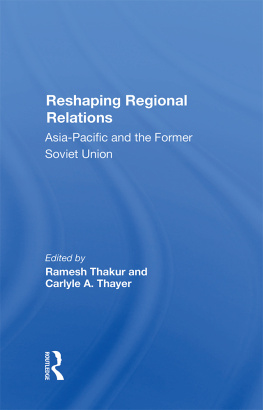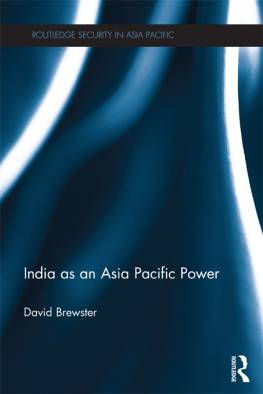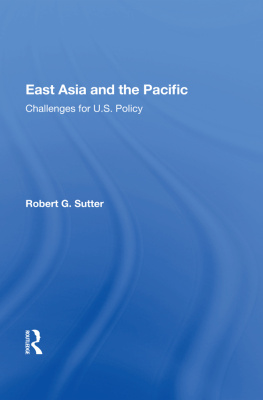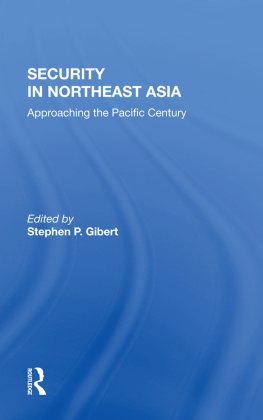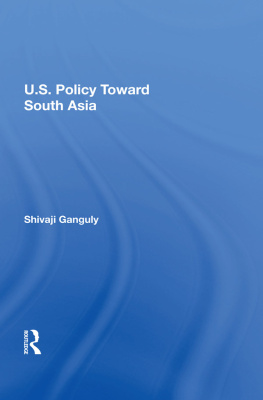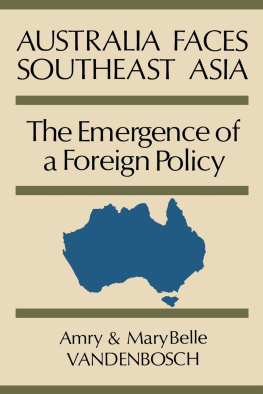First published 1987 by Westview Press, Inc.
Published 2019 by Routledge
52 Vanderbilt Avenue, New York, NY 10017
2 Park Square, Milton Park, Abingdon, Oxon OX14 4RN
Routledge is an imprint of the Taylor & Francis Group, an informa business
Copyright 1987 Taylor & Francis
All rights reserved. No part of this book may be reprinted or reproduced or utilised in any form or by any electronic, mechanical, or other means, now known or hereafter invented, including photocopying and recording, or in any information storage or retrieval system, without permission in writing from the publishers.
Notice:
Product or corporate names may be trademarks or registered trademarks, and are used only for identification and explanation without intent to infringe.
Library of Congress Cataloging-in-Publication Data
The Soviet Union as an Asian Pacific power.
(Westview special studies in international security)
Bibliography: p.
1. AsiaForeign relationsSoviet Union.
2. Soviet UnionForeign relationsAsia. 3. Soviet UnionForeign relations1975 . 4. Soviet Union Politics and government1953 . 5. Gorbachev, Mikhail Sergeevich, 1931 . I. Thakur, Ramesh Chandra, 1948 . II. Thayer, Carlyle A.
III. Series.
DS33.4.S65S69 1987 327.4705 87-21686
National Library of Australia Cataloguing-in-Publication Data
The Soviet Union as an Asian Pacific Power
Includes index.
ISBN 0 333 43078 6.
1. Soviet UnionForeign relationsAsia. 2. Soviet
UnionForeign relationsPacific Asia. 3. Asia
Foreign relationsSoviet Union. 4. Pacific Area
Foreign relationsSoviet Union. I. Thakur, Ramesh
Chandra, 1948 . Thayer, Carlyle A.
327.4705
ISBN 13: 978-0-367-29615-5 (hbk)
1
Introduction
Ramesh Thakur and Carlyle A. Thayer
According to one scholar of the USSR, "[t]he coming to power of any new top leader in the Soviet Union changes, to a greater or lesser extent, the correlation of forces among the various institutional interests, opinion groupings and issue networks which exist within both the domestic and foreign policy making realms." The case of Mikhail Gorbachev has proved no exception to this rule. The turnover of General Secretaries has been unexpectedly frequent in the Soviet Union in recent years. However, Yuri Andropov and Konstantin Chernenko lacked both health and time to leave a mark upon Soviet history.
Mikhail Gorbachev by contrast has seized the opportunity, if not with relish, then at least with evident vigour to try and reshape Soviet society both domestically and in its international relations. In so doing, Gorbachev has defied early predictions of maintaining the tradition of "[c]ontinuity, caution and consensus" characteristic of "a system revolutionary in doctrine but deeply conservative in practice." Consequently, continued the New York Times editorial, "whatever his ambitions, Mr. Gorbachev is unlikely soon to make waves."
If "we base our conclusions on the course of events since 1949," Geoffrey Barraclough has noted, then "it would be ... easy and ... plausible to argue that the world was moving not into an Atlantic but into a Pacific age." Europe has been a settled if divided continent since the Second World War. In the Pacific theatre, the war began earlier and ended later. It was the Pacific war which ushered in the nuclear age; it is the Pacific which remains the scene of competing claims, great power rivalry, and residual regional tensions, some of which predate both world wars.
In 1986, Mikhail Gorbachev, General Secretary of the Communist Party of the Soviet Union (CPSU), journeyed to the Soviet Far East Maritime Kray to present the Order of Lenin to the city of Vladivostok. While in this seaside city, he delivered a major policy speech which touched on both domestic and foreign policy issues. The General Secretary's remarks were broadcast live on 28 July 1986 by Soviet television and by Radio Moscow's home service.
Russian encounters in the Far East were not the happiest at the turn of the century, nor immediately after the establishment of the Soviet state. For all that, in July 1986 Gorbachev served notice that the USSR would engage in international relations as an Asian-Pacific power as much as a European power. In the eastward-looking approach adopted by Gorbachev at Vladivostok, the General Secretary may be said to have launched his own, or at least the Soviet, version of ostpolitik. Jerry Hough has noted that the "vast majority of men of the Brezhnev-Gromyko generation were born between 1900 and 1910 and were almost all thrust into high positions in the wake of the purges of 1937-1938. Men of this generation remember World War I; their fathers may have fought in the Russo-Japanese War and reminisced about it; they, themselves, were high officials in World War II."
At the same time as the Pacific is the scene of much contemporary tension, it also contains some of the most dynamic economies of the post-war period. Even the US trade with Asia-Pacific surpassed that with Europe in the 1980s. It was appropriate therefore that Gorbachev's call at Vladivostok for improved international relationships in the Asian-Pacific area were preceded by calls for economic development of the Soviet Far East. That is, the Soviet Union's identity as an Asian-Pacific power is critical to Gorbachev's twin concerns of the security of the USSR and the rejuvenation of its economy.
Ambassador Evgeni Samoteikin's chapter seeks to explain and interpret the meaning of the Vladivostok address, and to respond to critical reactions in the West to aspects of the speech. It is an interesting statement for being simultaneously an affirmation of superpower legitimacy for the Soviet role in the Pacific, and an attempted reassurance against any military or other anti-Western designs in the South Pacific.
An early indication of Gorbachev's firmness of intent and search for new directions was the scale of personnel changes in the highest echelons of party and state organs, a subject which is discussed by Graeme Gill. Dissatisfaction with the intractability and durability of problems had perhaps suggested to the General Secretary that fresh minds ought to be - are an important and early item on the agenda of authority building. Personnel changes are more significant in the foreign policy realm than in the domestic because of the relatively fewer people who occupy key positions, and who can therefore be made more readily responsive through a tightened chain of command to the policy preferences of the General Secretary.
Another characterisitc of the Gorbachev approach seems to be to make the political environment more receptive to the possibility of fundamental change by engaging in bracing rhetoric at the declaratory level prior to policy innovations at the operational level. Changes both in the climate of opinion and in personnel can be prerequisites to policy innovations. The Vladivostok address confirmed Gorbachev's reputation as an impressive salesman of ideas who through a masterful campaign of public diplomacy can set the agenda for international affairs and force opponents into a reactive role.


